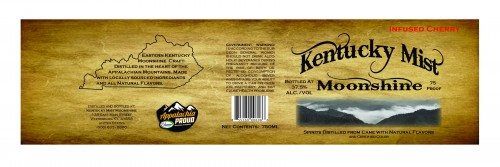 Remember the internet went wild a few weeks ago when it sounded like some goofball was saying it had nearly exclusive rights to use the term Kentucky? The Associated Press ran with it here: “The owners of Kentucky Mist distillery say University of Kentucky attorneys have sent them a letter asserting the school owns the rights to the word ‘Kentucky,’ at least on clothing.” This story just keeps getting better and better, because first it just sounded crazy, and now it has, perhaps, blown up in the instigator’s face. I am sure you can picture the new crop of UK freshmen lovingly mashing this moonshine in the dorm or maybe in a chemistry lab run amok.
Remember the internet went wild a few weeks ago when it sounded like some goofball was saying it had nearly exclusive rights to use the term Kentucky? The Associated Press ran with it here: “The owners of Kentucky Mist distillery say University of Kentucky attorneys have sent them a letter asserting the school owns the rights to the word ‘Kentucky,’ at least on clothing.” This story just keeps getting better and better, because first it just sounded crazy, and now it has, perhaps, blown up in the instigator’s face. I am sure you can picture the new crop of UK freshmen lovingly mashing this moonshine in the dorm or maybe in a chemistry lab run amok.
Kentucky Mist Moonshine Inc. (KMMI) filed a declaratory judgment action against the University of Kentucky in federal district court yesterday. In its complaint, Kentucky Mist asks the court to declare that its KENTUCKY MIST MOONSHINE mark does not infringe or dilute UK’s registration for KENTUCKY. Kentucky Mist also asks the court to cancel UK’s registration.
By Frank Knizner, J.D., Dan Christopherson, Trademark Lawyer, and Robert C. Lehrman, Attorney
UK obtained a federal trademark registration for KENTUCKY for clothing and other goods in 1997, after alleging it had acquired distinctiveness in the mark through its substantially exclusive and continuous use of the mark in connection with these goods. In theory, if UK’s trademark rights are valid, anyone who has used the word “Kentucky” on a T-shirt since 1997 without UK’s permission may have infringed UK’s trademark rights. Sound ridiculous? Kentucky Mist certainly thought so. Instead of giving in to UK’s demands to abandon its application to register KENTUCKY MIST MOONSHINE for use on similar clothing, Kentucky Mist sued.
The type of lawsuit that Kentucky Mist has brought—a declaratory judgment action—is sort of the “reverse” of a typical lawsuit. Recall that it was UK who started this whole dispute, sending a demand letter to Kentucky Mist. In the letter, UK threatened to file a “Notice of Opposition” with the Trademark Trial and Appeal Board and to “consider further action as it deems necessary” if Kentucky Mist did not abandon its pending trademark application. UK, then, is the party who believes that its mark is being infringed, and Kentucky Mist is the party arguing that its mark doesn’t infringe. UK’s letter is at least polite when it says: “It is our present position that [KMMI’s use of the mark] is likely to cause deception, confusion, and mistake as to … affiliation, connection or association with the University, and as to the University’s sponsorship or approval of [KMMI’s] activities in violation of federal law.”
In a typical lawsuit, you would expect that UK would be the one suing Kentucky Mist. Not so in a declaratory judgment action, though, and here’s why: UK’s “threat” to oppose Kentucky Mist’s registration or take further action is the type of activity that, in some cases, is enough to allow the recipient of the threat (i.e., the “potential defendant”) to file a declaratory judgment action, rather than just wait around to be opposed or sued. In this case, that’s precisely what Kentucky Mist did. They anticipated being sued and decided to be the party bringing the action instead of the party defending against the action.
One big issue in this case is whether UK’s trademark registration is valid. Kentucky Mist, of course, says that it is not and argues:
- “UK’s Kentucky mark does not constitute a valid and protectable mark because it is a well-known geographic reference that lacks distinctiveness and does not serve as a source identifier for [UK].”
- “The KENTUCKY mark has not acquired distinctiveness, since dozens of non-parties have produced clothing bearing the word ‘Kentucky’ both before and since the registration of the KENTUCKY mark”; and
- UK’s mark should be cancelled due to fraud. (Note: Kentucky Mist does not actually use the word “fraud” in its complaint, but does allege all of the elements of fraud.)
For the cancellation, Kentucky Mist has an uphill battle. UK is entitled to a presumption of validity for its trademark registration, putting the burden on Kentucky Mist to show that UK’s registration is invalid, and that the mark has not acquired distinctiveness. Regarding the fraud claim, Kentucky Mist will need to prove not only that UK’s declaration was false, but also that the false declaration was material to the registrability of the mark, that UK knew the declaration was false, and that UK intended to deceive the USPTO with this declaration. These types of claims tend to be very difficult to win without clear evidence showing an intent to deceive.
Kentucky Mist’s other counts relate to whether there is a likelihood of confusion between KENTUCKY MIST MOONSHINE and KENTUCKY and whether KENTUCKY MIST MOONSHINE dilutes UK’s KENTUCKY mark. Unlike trademark infringement, trademark dilution does not require proof that consumers are likely to be confused as to the source of the allegedly dilutive mark. Rather, dilution exists to protect the owner of a famous mark from marks that are similar to the famous mark and may impair the famous mark’s distinctiveness. We expect Kentucky Mist has a much greater likelihood of success on these counts, since the court may determine that UK’s rights are not so broad as to preclude any use of the word “Kentucky.”
UK’s response is due November 23. Based on our experience, we expect that UK may respond with a motion to dismiss the action, contesting the court’s jurisdiction over the controversy. As we learned in Union Wine Company v. FN Cellars, we expect that such a motion would fail, since UK told KMMI that it is prepared to file a Notice of Opposition and take “further action” as it deems necessary. Remember, when that scenario played out in Union Wine, that case settled quickly.



Leave a Reply